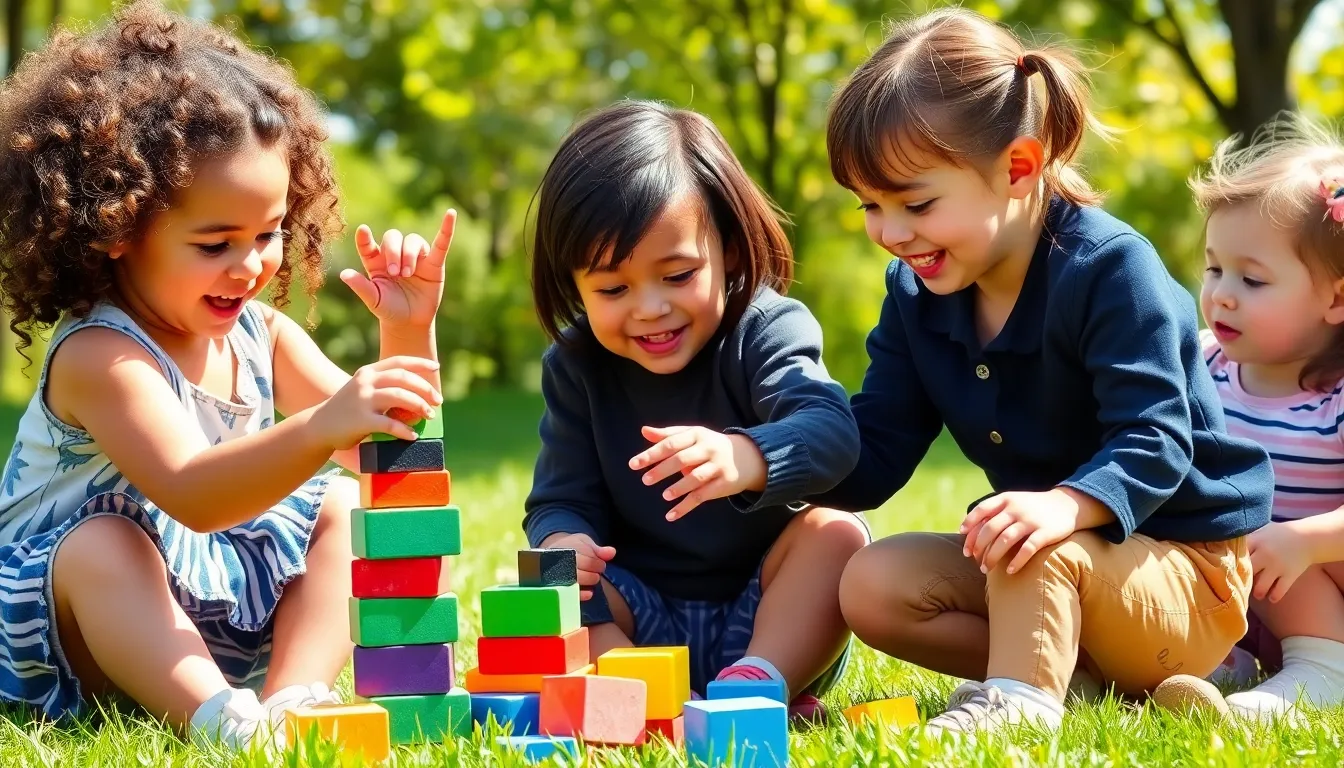Toddler brain development is like watching a superhero movie unfold in real life. One moment, they’re mastering the art of stacking blocks, and the next, they’re launching into a full-blown tantrum over a misplaced snack. It’s a wild ride, but understanding what’s happening in those tiny heads can be a game-changer for parents and caregivers.
Table of Contents
ToggleUnderstanding Toddler Brain Development
Toddler brain development encompasses significant transformations that shape a child’s understanding of the world. Research shows that during ages 1 to 3, a child’s brain grows rapidly, reaching about 80% of its adult size. Interaction with parents and caregivers fosters vital connections between neurons. Engaging in age-appropriate activities enhances cognitive functions.
Language acquisition becomes evident as toddlers begin to string words together. This process allows them to express needs and emotions more clearly. Social skills also start to emerge, as she learns to share and play alongside peers. Emotional regulation presents a challenge, often leading to tantrums when frustrations arise.
Physical development mirrors cognitive growth. Activities like stacking blocks or running refine motor skills. These actions support hand-eye coordination and spatial awareness. Exploration drives learning, as they learn through trial and error. Providing a safe space encourages independence.
The importance of play in brain development cannot be overstated. Playtime promotes problem-solving abilities and creativity. Engaging in imaginative play helps strengthen neural pathways. Opportunities to explore different scenarios enhance flexibility in thinking.
Nutrition impacts brain health significantly. A balanced diet rich in omega-3 fatty acids, fruits, and vegetables fuels growth and development. Consistent sleep patterns contribute to cognitive functions, allowing for better memory retention. Regular routines help establish a sense of security.
Monitoring developmental milestones serves as a guideline for ensuring healthy growth. Parents and caregivers can observe skills in communication, physical activity, and social abilities to track progress. Resources from pediatric experts offer support and insight into individual variations in development.
Key Stages of Brain Growth

Toddler brain development involves key stages that greatly influence cognitive and emotional growth. Recognizing these stages supports caregivers in fostering healthy development.
Rapid Brain Growth
Rapid brain growth occurs during toddler years, with the brain reaching 80% of its adult size by age 3. During this period, toddlers experience exponential increases in neural connections. New skills emerge as they explore their environment. Learning words and recognizing familiar faces reflects this growth. Parents play a crucial role in providing stimulating experiences that enhance this development. Engaging in conversation and interactive play nurtures essential cognitive abilities. By the end of this phase, toddlers demonstrate improved problem-solving and emotional responses.
Synapse Formation
Synapse formation rapidly develops during the toddler stage, with millions of connections formed among neurons. This process allows for improved communication within the brain. Each interaction contributes to strengthening synaptic connections, fostering skills in language and socialization. Frequent engagement in various activities encourages optimal synapse growth. Experiences such as reading, singing, and playing aid in this development. By creating enriching environments, caregivers provide opportunities for toddlers to make connections essential for their learning. As a result, emotional regulation and complex thinking skills become more pronounced during this stage.
Factors Influencing Brain Development
Nutrition and diet play pivotal roles in toddler brain health. Consuming a balanced diet provides essential nutrients like omega-3 fatty acids, iron, and vitamins that support cognitive functions. Iron-rich foods, including lean meats and spinach, aid in memory retention, while omega-3 sources, like fish and walnuts, promote healthy brain growth. Regular meals and nutritious snacks help maintain consistent energy levels, which are crucial for active learning. Caregivers should prioritize whole fruits, vegetables, and whole grains to support overall growth.
Environmental stimuli significantly impact brain development as well. Exposure to diverse experiences fosters neural connections. Engaging with interactive toys, nature, and varied social situations enhances creativity and problem-solving skills. Safe environments that encourage exploration stimulate curiosity, allowing toddlers to learn through play. Regularly reading and singing to toddlers not only enriches their vocabulary but also strengthens emotional bonding. Creating a sensory-rich environment proves vital for supporting complex thinking, and providing opportunities for interaction encourages social skills.
Importance of Play in Development
Play holds a significant role in toddler brain development. Engaging in play nurtures creativity, problem-solving, and social skills.
Types of Play
Exploratory play involves interaction with objects, driving curiosity and learning. Symbolic play encourages imagination, with children acting out scenarios. Constructive play fosters spatial awareness and fine motor skills through building and creating. Social play emphasizes interaction with peers, enhancing communication and cooperation. Each type of play contributes uniquely to overall development by providing ample opportunities for exploration and learning.
Benefits of Play
Play stimulates neural connections crucial for cognitive growth. It promotes emotional regulation, helping toddlers identify and manage feelings. Through play, children enhance their communication skills, learning to express thoughts clearly. Problem-solving abilities improve as toddlers navigate challenges during play. Furthermore, play supports physical development by refining motor skills and coordination. Engaging in play also creates bonds with caregivers, strengthening relationships while fostering a sense of security and confidence.
Milestones in Toddler Development
During toddler years, significant milestones mark cognitive and emotional growth. Tracking these developments supports understanding of a child’s progress.
Cognitive Milestones
Cognitive milestones emerge rapidly. By age 2, toddlers typically can identify common objects and understand simple instructions. At this stage, they show curiosity through exploration and begin to solve basic problems. Beyond simple stacking, activities like shape sorting enhance critical thinking. Vocabulary expands quickly as toddlers may know around 200 words by age 2. They often start to combine words into short phrases, showcasing their developing communication skills. Engaging in play that encourages these cognitive skills fosters neural connections, crucial for further development.
Emotional and Social Milestones
Emotional and social milestones appear alongside cognitive ones. By age 2, toddlers recognize and express basic emotions, such as happiness or frustration. They may experience temper tantrums as they navigate feelings, allowing opportunities for growth in emotional regulation. Sharing toys or taking turns with peers marks significant social development. Parallel play with other children helps build foundational social skills. At age 3, toddlers often demonstrate empathy by showing concern for others. Activities that promote group play enhance cooperation and confidence, reinforcing social interactions amid their emotional exploration.
Toddler brain development is a fascinating journey marked by rapid growth and transformation. During these formative years, children not only learn to navigate their emotions but also develop essential cognitive and social skills. Engaging in play and providing a nurturing environment are crucial for fostering this growth.
By prioritizing nutrition and creating stimulating experiences, caregivers can significantly impact a toddler’s brain health. Observing developmental milestones offers valuable insights into a child’s progress, allowing parents to support their unique learning paths. Embracing this dynamic phase of development can lead to a brighter future for toddlers as they explore the world around them.




